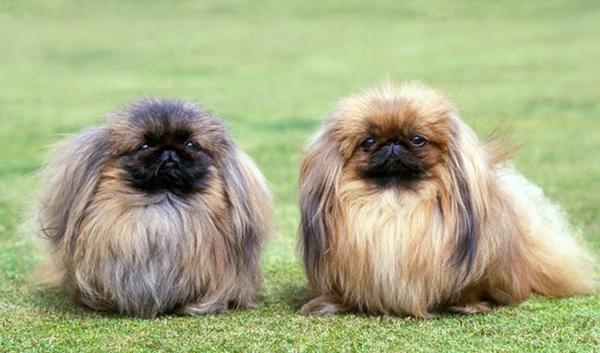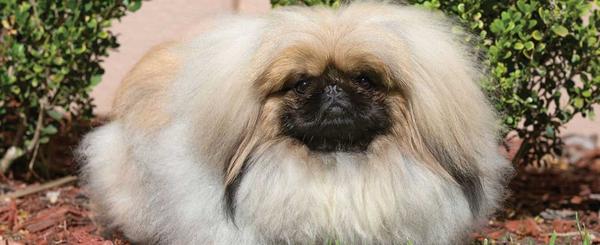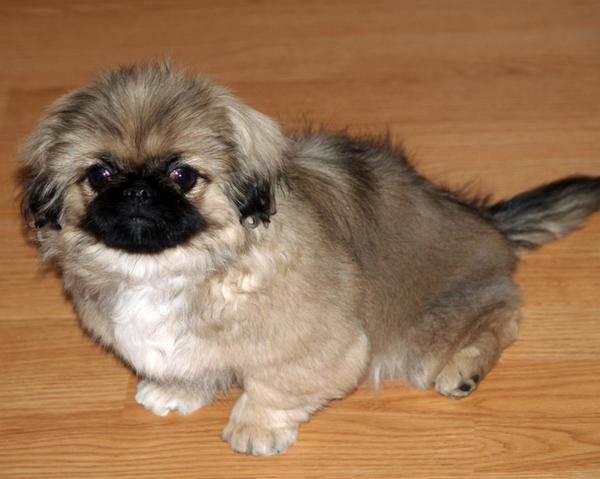Pekingese
also known as Peking Lion Dog, Pelchie Dog, Chinese Spaniel, Peke, Lion Dog, Peking Palasthund

 History
History
The Pekingese is a small, long-haired dog breed that has a rich history dating back to ancient China. The breed's name, "Pekingese," refers to their origin in the city of Peking, which is now known as Beijing. These dogs were highly prized by the Chinese imperial court, and they were considered a sacred breed in China. They were kept as lapdogs by the emperor and the members of the imperial court, and were also kept as guards to protect the emperors' palaces and temples.
The Pekingese were brought to England in 1860 as part of the "Pekingese loot" from the Summer Palace of the Chinese Emperor during the Second Opium War. They were brought to England by British soldiers and were highly sought after by the upper classes. This helped to increase the popularity of the breed around the world. The Pekingese was officially recognized by the American Kennel Club (AKC) in 1906.
The Pekingese dog is also known as the "Lion Dog" because of its mane-like coat, which is said to resemble that of a lion. This coat was highly prized in ancient China and was considered a symbol of wealth and nobility. Pekingese were also known to be kept by Buddhist Monks in ancient China, where they were believed to have spiritual powers and were considered sacred. Pekingese were also considered to be a symbol of good luck and were often given as gifts to Chinese royalty and nobility.
This breed is known for its regal appearance, intelligence, and loyalty. They have a calm and dignified temperament, which makes them well-suited for being a companion dog. They are also known for their playfulness, which makes them a great family dog. The Pekingese Club of America was founded in 1909, making it the first breed-specific club in America. The Pekingese has also been featured in literature and art throughout history, such as in the famous Chinese novel "Journey to the West" which tells the story of a Pekingese named "White Dragon Horse".
Breed Information
Is Pekingese a purebred?
Purebred
What were Pekingeses originally used for?
Lap dog
How Long Do Pekingeses Live? What is average life expectancy for a Pekingese? How long can Pekingeses live?
13-15 years
The average Pekingese lifespan is somewhere between 13-15 years, provided they aren't beset by any exceptional health issues or injuries.
Pekingese Height & Weight
How big is a full grown Pekingese?

| Height | ||||
|---|---|---|---|---|
| Average | 6 months | 12 months | 18 months | |
| Male | 6-9 inches (15.2 - 22.9 cm) | 3.5 inches (8.9 cm) | 5.5 inches (14 cm) | 7.5 inches (19.1 cm) |
| Female | 6-9 inches (15.2 - 22.9 cm) | 3.5 inches (8.9 cm) | 5.0 inches (12.7 cm) | 6.5 inches (16.5 cm) |
| Weight | ||||
|---|---|---|---|---|
| Average | 6 months | 12 months | 18 months | |
| Male | 8-14 pounds (4 - 6 kg) | 3.5 pounds (2 kg) | 4.0 pounds (2 kg) | 6.5 pounds (3 kg) |
| Female | 7-13 pounds (3 - 6 kg) | 3.5 pounds (2 kg) | 4.0 pounds (2 kg) | 6.5 pounds (3 kg) |
Do Pekingeses get fat easily?
![]()
![]()
![]()
![]()
![]()
The Pekingese is a breed that has an average risk of becoming obese. Daily walks and a balanced diet of quality dry dog food can help maintain a healthy weight. An active lifestyle and monitoring weight regularly is recommended.
Are Pekingeses Hypoallergenic?
No
Unfortunately, the Pekingese is not hypoallergenic, making it not a good choice for a dog lover who suffers from pet allergies.
What is a Pekingese personality? What are Pekingese dogs best known for?
Affectionate
Good-natured
Opinionated
Aggressive
Intelligent
Stubborn
Are Pekingeses heavy shedders? How Much Does a Pekingese Shed?
![]()
![]()
![]()
![]()
![]()
Pekingese dogs are not heavy shedders, but they will lose a significant amount of hair each year. To decrease the amount of shedding, you can regularly brush your Pekingese. This will remove loose hair and keep his coat growing in the same direction.
What is the watchdog ability of a Pekingese dog?
![]()
![]()
![]()
![]()
![]()
The Pekingese dogs are average watchdogs. If they sense something different, this breed will alert their owner.
Breed History
Where do Pekingeses come from?
China
What are Pekingeses descended from?
Unknown
What organizations or kennel clubs recognize/register the Pekingese breed?
American Canine Registry
American Kennel Club
America's Pet Registry
Canadian Kennel Club
Dog Registry of America Inc.
Federation Cynologique Internationale
Kennel Club of Great Britain
North American Purebred Registry, Inc.
American Canine Association, Inc.
Australian National Kennel Council
National Kennel Club
New Zealand Kennel Club
United Kennel Club
Pekingese Club Of America
When were Pekingeses first bred? How old is the Pekingese breed?
8th Century
What Breed Group is a Pekingese?
Toy (AKC:1906)
Companion Breeds (UKC)

Pekingese Appearance
What color are Pekingese eyes?
Brown
What color can Pekingese nose be naturally?
Black
What color can Pekingese coat be naturally?
Black
Fawn
Cream
Brindle
Gray
How long is a Pekingeses coat?
![]()
![]()
![]()
![]()
![]()
The coat of a Pekingese dog is generally known for its length.
How Dense Is The Pekingese Coat?
![]()
![]()
![]()
![]()
![]()
What is the texture of the hair of a Pekingese?
Straight
How many puppies can a Pekingese have in a litter? How many puppies can a Pekingese have in her first litter?
13-15 puppies per pregnancy
A Pekingese can have a litter of 13-15 puppies on average. However, it's worth noting that the size of the litters can vary greatly. Factors that can influence litter size include the health of the mother, breeding history, and genetics.
![]()
![]()
![]()
![]()
![]()
Pekingeses are known for their adaptability and versatility, they are capable of adapting well to a wide range of lifestyle changes and living environments. They are a highly adaptable breed, and make great companions for families and individuals of all lifestyles.

Pekingese Health Issues
Do Pekingeses have a lot of health problems?
![]()
![]()
![]()
![]()
![]()
The Pekingese breed is commonly healthy with low vet costs, regular check-ups may not be as necessary but it's important to keep an eye on their health and have them checked by a veterinarian when needed.
What are the major health concerns to be aware of when owning a Pekingese?
Patellar Luxation
Entropion
Skin Fold Dermatitis
Brachycephalic Syndrome
Exposure Keratopathy Syndrome
What are the less significant issues to keep in mind when it comes to Pekingeses?
KCS
Hydrocephalus
Eye Disease
Mitral Valve Disease
What are the occasional tests recommended for Pekingese breed?
Eye
Knee
Heart
X-Rays
Eye Examination
Physical Examination
Respiratory Tests

Pekingese Needs and Activities
Do Pekingeses have a lot of energy?
![]()
![]()
![]()
![]()
![]()
Pekingeses may be a good breed for those who prefer a more relaxed lifestyle. They tend to have a lower energy level than other breeds of dogs.
Do Pekingeses need socialization? How social are Pekingeses?
![]()
![]()
![]()
![]()
![]()
Pekingeses have average social needs compared to other breeds. They are known to be less active and independent than other breeds, and they are content with spending time alone and with their human family.
How much exercise should Pekingeses get?
![]()
![]()
![]()
![]()
![]()
The Pekingese is a breed that requires minimal physical activity to maintain a healthy lifestyle.
How much sleep should a Pekingese have? Do Pekingeses sleep a lot?
![]()
![]()
![]()
![]()
![]()
The Pekingese breed is known for their relaxed and calm nature and tendency to sleep for long periods of time.
Does a Pekingese drool a lot?
![]()
![]()
![]()
![]()
![]()
The Pekingese is a breed of dog that is characterized by its minimal drooling, making it an ideal choice for people who dislike drool marks on their clothing.
How much does it bark?
![]()
![]()
![]()
![]()
![]()
The Pekingese is a vocal breed, with a tendency to bark and howl frequently. They may not be the best fit for those seeking a quiet companion. Their barks can vary and can indicate different emotions and needs.
Do Pekingeses exhibit aggressive behavior to safeguard their home and territory? Do they possess a natural tendency to guard?
![]()
![]()
![]()
![]()
![]()
These dogs are known for their strong territorial instinct and protective nature. They will fiercely defend their territory and are highly alert and vigilant against any perceived threat to their home and family.
Are Pekingeses mouthy?
![]()
![]()
![]()
![]()
![]()
What is the likelihood of a Pekingese running away? Do they have a tendency to explore or wander frequently?
![]()
![]()
![]()
![]()
![]()
Do Pekingese dogs have a high prey drive?
![]()
![]()
![]()
![]()
![]()
What do Pekingeses enjoy doing? How do I keep my Pekingese busy?
Sniffing, Eating, Laying down, Walk, Training, Walking, Gardening, Tug-of-war, Fetch, Snuggling, Snow play, Socializing, Grooming, Walks
What is the energy level of a Pekingese? How much energy does a Pekingese have?
Low
Pekingeses are low-energy dogs. This breed make a great companion for a relatively inactive person. Pekingese dogs require a few short daily walks, and then they're happy snuggling next to you for the rest of the day.
![]()
![]()
![]()
![]()
![]()
How far should a Pekingese walk each week? How many miles should a Pekingese walk every week?
6 miles / week
There's really no limit to how far you walk your dog as long as they're comfortable. For Pekingese, it's at least 6 miles / week. Just remember to build distance and stamina gradually over time.
How much a Pekingese should exercise a day? How much activity does a Pekingese need?
20 minutes
In general most Pekingeses usually need at least 20 minutes of exercise daily. This can be spread across the day and include all sorts of high-energy activities, like walking, running and playing.
What level of grooming should be provided for a Pekingese?
![]()
![]()
![]()
![]()
![]()
This breed is known for having high grooming needs.
How often should you brush a Pekingese?
Weekly
Pekingese should be brushed at least once a week. Of course you can give them more frequent brushes if you find that they are still shedding a lot
What are the most commonly used brushing tools for Pekingeses?
Slicker Brush
Comb
Scissors
Nail Clipper
Costs
How many cups of food does a Pekingese eat?
1 cups
For an average 8-14 pound (4 - 6 kg) Pekingese feed 1 cups daily. But, keep in mind, the amount you feed is going to be dependent on the quality of the food you are feeding.
How Much Does a Pekingese Cost Daily?
$1.10 - $1.40 / day
The average cost of a Pekingese is somewhere $1.10 - $1.40 per day.
How Much Does a Pekingese Cost Per Month?
$35 - $42 / month
The average per month expenses of a Pekingese is between $35 - $42. This makes an average of $420 - $504 per year. It will be on the higher side when the dog is still small because it will need more frequent visits to the vet, shots.
Pekingese Characteristic
How intelligent is a Pekingese?
![]()
![]()
![]()
![]()
![]()
The Pekingese have the lowest degree of obedience intelligence. This breed is an independent "freethinker" and gets on the dumbest dog breeds list since they can also be stubborn — training a Pekingese is an exercise in patience.
How sensitive is a Pekingese dog?
![]()
![]()
![]()
![]()
![]()
Pekingese dogs are a less sensitive breed known for their adaptability and resilience. They tend to be less affected by new environments, people and noises. They can make great companions for families or individuals looking for a balanced and less sensitive pet that are not as demanding as highly sensitive breeds.
Are Pekingese dogs affectionate?
![]()
![]()
![]()
![]()
![]()
Do Pekingese do well in apartments? Are Pekingeses good indoor dogs?
![]()
![]()
![]()
![]()
![]()
Pekingeses are known for being excellent apartment dogs. They are fairly active indoors and will do okay without a yard.
Are Pekingeses good with kids? Are Pekingeses good around children?
![]()
![]()
![]()
![]()
![]()
Pekingese dogs are not kid-friendly.
Are Pekingeses good for elderly?
![]()
![]()
![]()
![]()
![]()
Are Pekingeses good with cats? How friendly Pekingeses are toward cats?
![]()
![]()
![]()
![]()
![]()
Pekingeses are very cat friendly dogs. They generally make good companions for cats.
Do Pekingese dogs get along with other dogs? Are Pekingeses OK with other dogs?
![]()
![]()
![]()
![]()
![]()
Pekingeses are average friendly towards other dogs. If they are raised with other dogs, they are likely to get along with them. And, if they are socialized properly from a young age, they will usually be great with other dogs.
How do Pekingese dogs interact with other pets? Are they considered pet-friendly?
![]()
![]()
![]()
![]()
![]()
Are Pekingeses friendly with strangers?
![]()
![]()
![]()
![]()
![]()
Pekingeses are average friendly around strangers. They can be wary around strangers and a little standoffish. Early socialisation is key.
Do Pekingeses like to play? Are Pekingeses playful?
![]()
![]()
![]()
![]()
![]()
Pekingese don't really like playing. You need to find another activity to make them happy.
Are Pekingese easily trained?
![]()
![]()
![]()
![]()
![]()
Pekingese dogs are known for their ease of training and ability to learn quickly, making them a popular choice for pet owners and trainers alike.
 Pros & Cons
Pros & Cons
Pros
- Cat Friendly
Pekingese dogs have a temperament that allows them to coexist peacefully with cats. - Affectionate
Pekingese are affectionate dogs that bond well with their owners. - Apartment Friendly
Pekingese are the best breed for apartment living. - Good with children
Pekingese are good with children and make great family pets.
Cons
- Prone to certain health issues
Pekingese are prone to certain health issues such as breathing difficulties and eye problems. - Not suitable for office environment
A Pekingese may not be the best choice for a dog to have in an office setting. - Odor
The Pekingese has a significant chance of emitting a bad smell. - Not Hypoallergenic
People with allergies should be aware that Pekingeses may cause allergic reactions. - Barking
Pekingeses are particularly loud in terms of their barking. - Grooming needs
Pekingese require regular grooming to keep their coat in good condition. Their coats need to be brushed and trimmed regularly.